#twitter privacy
Text
seeing everyone just mindlessly sign up for threads despite all the clear warning signs feels like I’m living in Sailor Moon or a magical girl anime episode where the Monster of the Day just set up shop over night and their product is literally draining your lifeforce for the Dark Kingdom but people keep going there
#only there's not even a hot monster girl involved#just privacy leaks and the right wing#threads#twitter#ame post
77K notes
·
View notes
Text

>First, we’ve discovered that about a quarter of all the internet connection in or out of the house were ad related. In a few hours, that’s about 10,000 out of 40,000 processed.
>We also discovered that every link on Twitter was blocked. This was solved by whitelisting the https://t.co domain.
>Once out browsing the Web, everything is loading pretty much instantly. It turns out most of that Page Loading malarkey we’ve been accustomed to is related to sites running auctions to sell Ad space to show you before the page loads. All gone now.
>We then found that the Samsung TV (which I really like) is very fond of yapping all about itself to Samsung HQ. All stopped now. No sign of any breakages in its function, so I’m happy enough with that.
>The primary source of distress came from the habitual Lemmings player in the house, who found they could no longer watch ads to build up their in-app gold. A workaround is being considered for this.
>The next ambition is to advance the Ad blocking so that it seamlessly removed YouTube Ads. This is the subject of ongoing research, and tinkering continues. All in all, a very successful experiment.
>Certainly this exceeds my equivalent childhood project of disassembling and assembling our rotary dial telephone. A project whose only utility was finding out how to make the phone ring when nobody was calling.
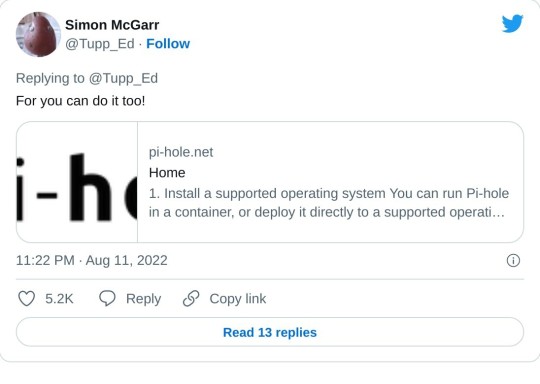
>Update: All4 on the telly appears not to have any ads any more. Goodbye Arnold Clarke!
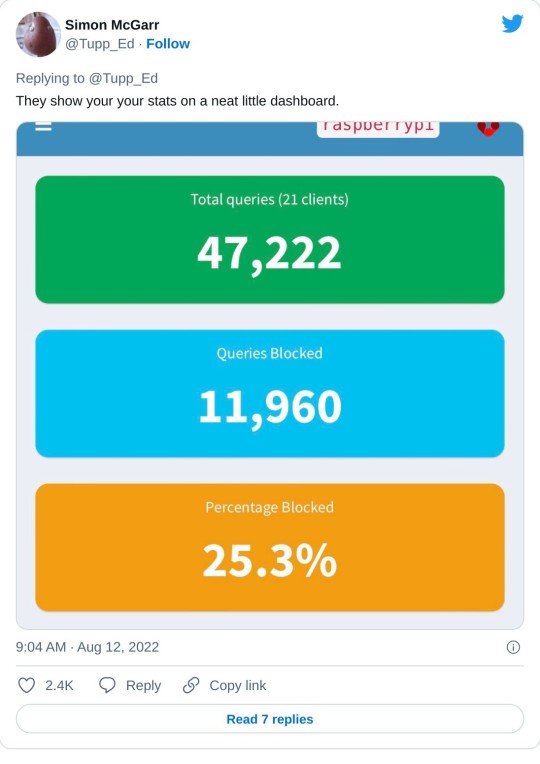
>Lemmings problem now solved.
>Can confirm, after small tests, that RTÉ Player ads are now gone and the player on the phone is now just delivering swift, ad free streams at first click.
>Some queries along the lines of “Are you not stealing the internet?” Firstly, this is my network, so I may set it up as I please (or, you know, my son can do it and I can give him a stupid thumbs up in response). But there is a wider question, based on the ads=internet model.
>I’m afraid I passed the You Wouldn’t Download A Car point back when I first installed ad-blocking plug-ins on a browser. But consider my chatty TV. Individual consumer choice is not the method of addressing pervasive commercial surveillance.
>Should I feel morally obliged not to mute the TV when the ads come on? No, this is a standing tension- a clash of interests. But I think my interest in my family not being under intrusive or covert surveillance at home is superior to the ad company’s wish to profile them.

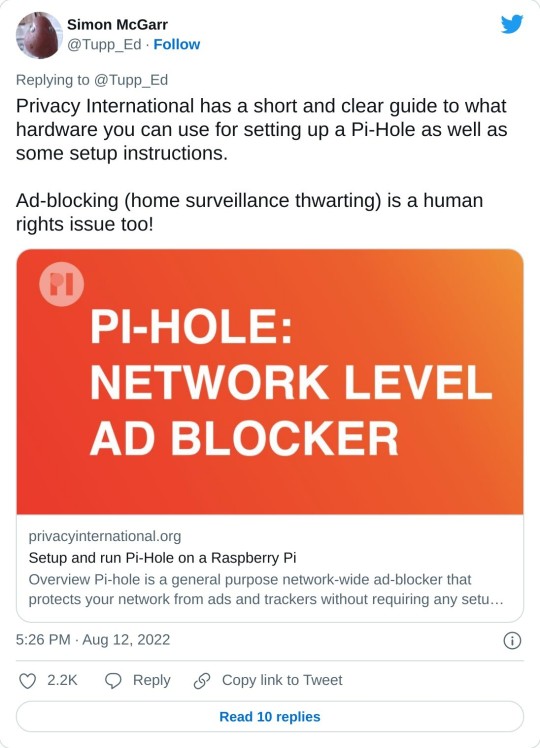
>Aside: 24 hours of Pi Hole stats suggests that Samsung TVs are very chatty. 14,170 chats a day.
>YouTube blocking seems difficult, as the ads usually come from the same domain as the videos. Haven’t tried it, but all of the content can also be delivered from a no-cookies version of the YouTube domain, which doesn’t have the ads. I have asked my son to poke at that idea.
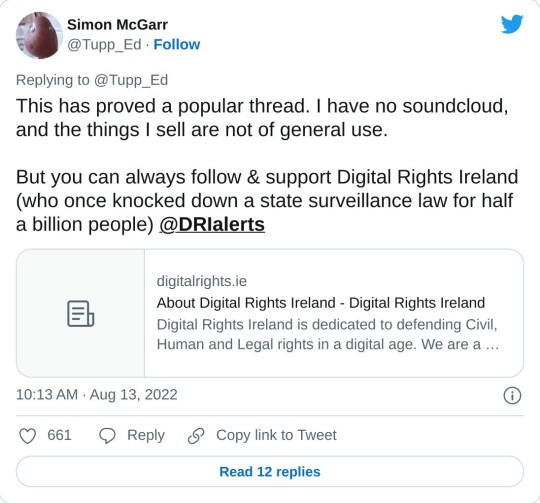
#samsung#privacy#surveillance#pi hole#raspberry pi#internet#adblock#adbusting#youtube#twitter thread#pihole
166K notes
·
View notes
Text
UPDATE! REBLOG THIS VERSION!
#reaux speaks#zoom#terms of service#ai#artificial intelligence#privacy#safety#internet#end to end encryption#virtual#remote#black mirror#joan is awful#twitter#instagram#tiktok#meetings#therapy
23K notes
·
View notes
Text
How to Look at Twitter Without an Account
How to Look at Twitter Without an Account
#twitter
Twitter is a social media platform that allows users to share short messages, known as tweets. Tweets can be about anything, from current events to personal thoughts. Twitter is a popular platform for staying up-to-date on the latest news and trends, and for connecting with friends and family.
However, you don’t need to have a Twitter account to view tweets. There are a few ways to look at…
View On WordPress
#access twitter without account#browse twitter without account#explore twitter without account#follow people on twitter without account#how to look at twitter without account#read twitter without account#search twitter without account#see twitter without account#twitter anonymous#twitter api#twitter client#twitter explore#twitter news#twitter privacy#twitter trends#twitter without account#view twitter without account
0 notes
Text
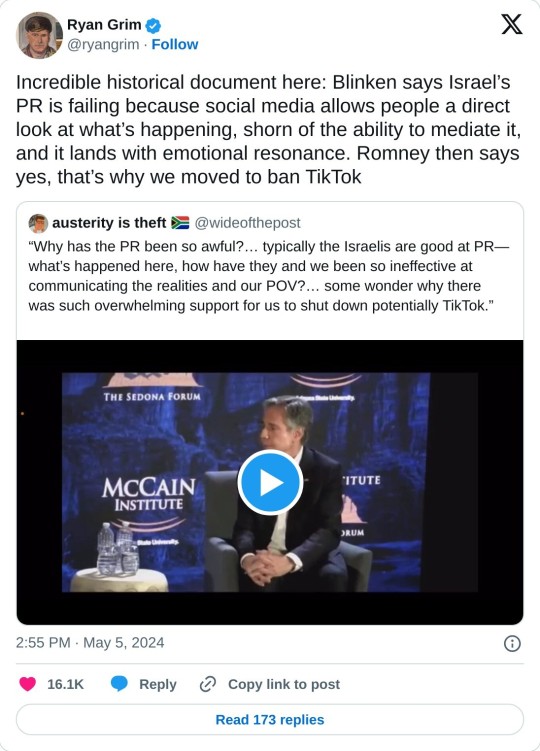
2K notes
·
View notes
Text
Pluralistic: Leaving Twitter had no effect on NPR's traffic

I'm coming to Minneapolis! This Sunday (Oct 15): Presenting The Internet Con at Moon Palace Books. Monday (Oct 16): Keynoting the 26th ACM Conference On Computer-Supported Cooperative Work and Social Computing.

Enshittification is the process by which a platform lures in and then captures end users (stage one), who serve as bait for business customers, who are also captured (stage two), whereupon the platform rug-pulls both groups and allocates all the value they generate and exchange to itself (stage three):
https://pluralistic.net/2023/01/21/potemkin-ai/#hey-guys
Enshittification isn't merely a form of rent-seeking – it is a uniquely digital phenomenon, because it relies on the inherent flexibility of digital systems. There are lots of intermediaries that want to extract surpluses from customers and suppliers – everyone from grocers to oil companies – but these can't be reconfigured in an eyeblink the that that purely digital services can.
A sleazy boss can hide their wage-theft with a bunch of confusing deductions to your paycheck. But when your boss is an app, it can engage in algorithmic wage discrimination, where your pay declines minutely every time you accept a job, but if you start to decline jobs, the app can raise the offer:
https://pluralistic.net/2023/04/12/algorithmic-wage-discrimination/#fishers-of-men
I call this process "twiddling": tech platforms are equipped with a million knobs on their back-ends, and platform operators can endlessly twiddle those knobs, altering the business logic from moment to moment, turning the system into an endlessly shifting quagmire where neither users nor business customers can ever be sure whether they're getting a fair deal:
https://pluralistic.net/2023/02/19/twiddler/
Social media platforms are compulsive twiddlers. They use endless variation to lure in – and then lock in – publishers, with the goal of converting these standalone businesses into commodity suppliers who are dependent on the platform, who can then be charged rent to reach the users who asked to hear from them.
Facebook designed this playbook. First, it lured in end-users by promising them a good deal: "Unlike Myspace, which spies on you from asshole to appetite, Facebook is a privacy-respecting site that will never, ever spy on you. Simply sign up, tell us everyone who matters to you, and we'll populate a feed with everything they post for public consumption":
https://lawcat.berkeley.edu/record/1128876
The users came, and locked themselves in: when people gather in social spaces, they inadvertently take one another hostage. You joined Facebook because you liked the people who were there, then others joined because they liked you. Facebook can now make life worse for all of you without losing your business. You might hate Facebook, but you like each other, and the collective action problem of deciding when and whether to go, and where you should go next, is so difficult to overcome, that you all stay in a place that's getting progressively worse.
Once its users were locked in, Facebook turned to advertisers and said, "Remember when we told these rubes we'd never spy on them? It was a lie. We spy on them with every hour that God sends, and we'll sell you access to that data in the form of dirt-cheap targeted ads."
Then Facebook went to the publishers and said, "Remember when we told these suckers that we'd only show them the things they asked to see? Total lie. Post short excerpts from your content and links back to your websites and we'll nonconsensually cram them into the eyeballs of people who never asked to see them. It's a free, high-value traffic funnel for your own site, bringing monetizable users right to your door."
Now, Facebook had to find a way to lock in those publishers. To do this, it had to twiddle. By tiny increments, Facebook deprioritized publishers' content, forcing them to make their excerpts grew progressively longer. As with gig workers, the digital flexibility of Facebook gave it lots of leeway here. Some publishers sensed the excerpts they were being asked to post were a substitute for visiting their sites – and not an enticement – and drew down their posting to Facebook.
When that happened, Facebook could twiddle in the publisher's favor, giving them broader distribution for shorter excerpts, then, once the publisher returned to the platform, Facebook drew down their traffic unless they started posting longer pieces. Twiddling lets platforms play users and business-customers like a fish on a line, giving them slack when they fight, then reeling them in when they tire.
Once Facebook converted a publisher to a commodity supplier to the platform, it reeled the publishers in. First, it deprioritized publishers' posts when they had links back to the publisher's site (under the pretext of policing "clickbait" and "malicious links"). Then, it stopped showing publishers' content to their own subscribers, extorting them to pay to "boost" their posts in order to reach people who had explicitly asked to hear from them.
For users, this meant that their feeds were increasingly populated with payola-boosted content from advertisers and pay-to-play publishers who paid Facebook's Danegeld to reach them. A user will only spend so much time on Facebook, and every post that Facebook feeds that user from someone they want to hear from is a missed opportunity to show them a post from someone who'll pay to reach them.
Here, too, twiddling lets Facebook fine-tune its approach. If a user starts to wean themself off Facebook, the algorithm (TM) can put more content the user has asked to see in the feed. When the user's participation returns to higher levels, Facebook can draw down the share of desirable content again, replacing it with monetizable content. This is done minutely, behind the scenes, automatically, and quickly. In any shell game, the quickness of the hand deceives the eye.
This is the final stage of enshittification: withdrawing surpluses from end-users and business customers, leaving behind the minimum homeopathic quantum of value for each needed to keep them locked to the platform, generating value that can be extracted and diverted to platform shareholders.
But this is a brittle equilibrium to maintain. The difference between "God, I hate this place but I just can't leave it" and "Holy shit, this sucks, I'm outta here" is razor-thin. All it takes is one privacy scandal, one livestreamed mass-shooting, one whistleblower dump, and people bolt for the exits. This kicks off a death-spiral: as users and business customers leave, the platform's shareholders demand that they squeeze the remaining population harder to make up for the loss.
One reason this gambit worked so well is that it was a long con. Platform operators and their investors have been willing to throw away billions convincing end-users and business customers to lock themselves in until it was time for the pig-butchering to begin. They financed expensive forays into additional features and complementary products meant to increase user lock-in, raising the switching costs for users who were tempted to leave.
For example, Facebook's product manager for its "photos" product wrote to Mark Zuckerberg to lay out a strategy of enticing users into uploading valuable family photos to the platform in order to "make switching costs very high for users," who would have to throw away their precious memories as the price for leaving Facebook:
https://www.eff.org/deeplinks/2021/08/facebooks-secret-war-switching-costs
The platforms' patience paid off. Their slow ratchets operated so subtly that we barely noticed the squeeze, and when we did, they relaxed the pressure until we were lulled back into complacency. Long cons require a lot of prefrontal cortex, the executive function to exercise patience and restraint.
Which brings me to Elon Musk, a man who seems to have been born without a prefrontal cortex, who has repeatedly and publicly demonstrated that he lacks any restraint, patience or planning. Elon Musk's prefrontal cortical deficit resulted in his being forced to buy Twitter, and his every action since has betrayed an even graver inability to stop tripping over his own dick.
Where Zuckerberg played enshittification as a long game, Musk is bent on speedrunning it. He doesn't slice his users up with a subtle scalpel, he hacks away at them with a hatchet.
Musk inaugurated his reign by nonconsensually flipping every user to an algorithmic feed which was crammed with ads and posts from "verified" users whose blue ticks verified solely that they had $8 ($11 for iOS users). Where Facebook deployed substantial effort to enticing users who tired of eyeball-cramming feed decay by temporarily improving their feeds, Musk's Twitter actually overrode users' choice to switch back to a chronological feed by repeatedly flipping them back to more monetizable, algorithmic feeds.
Then came the squeeze on publishers. Musk's Twitter rolled out a bewildering array of "verification" ticks, each priced higher than the last, and publishers who refused to pay found their subscribers taken hostage, with Twitter downranking or shadowbanning their content unless they paid.
(Musk also squeezed advertisers, keeping the same high prices but reducing the quality of the offer by killing programs that kept advertisers' content from being published along Holocaust denial and open calls for genocide.)
Today, Musk continues to squeeze advertisers, publishers and users, and his hamfisted enticements to make up for these depredations are spectacularly bad, and even illegal, like offering advertisers a new kind of ad that isn't associated with any Twitter account, can't be blocked, and is not labeled as an ad:
https://www.wired.com/story/xs-sneaky-new-ads-might-be-illegal/
Of course, Musk has a compulsive bullshitter's contempt for the press, so he has far fewer enticements for them to stay. Quite the reverse: first, Musk removed headlines from link previews, rendering posts by publishers that went to their own sites into stock-art enigmas that generated no traffic:
https://www.theguardian.com/technology/2023/oct/05/x-twitter-strips-headlines-new-links-why-elon-musk
Then he jumped straight to the end-stage of enshittification by announcing that he would shadowban any newsmedia posts with links to sites other than Twitter, "because there is less time spent if people click away." Publishers were advised to "post content in long form on this platform":
https://mamot.fr/@pluralistic/111183068362793821
Where a canny enshittifier would have gestured at a gaslighting explanation ("we're shadowbanning posts with links because they might be malicious"), Musk busts out the motto of the Darth Vader MBA: "I am altering the deal, pray I don't alter it any further."
All this has the effect of highlighting just how little residual value there is on the platform for publishers, and tempts them to bolt for the exits. Six months ago, NPR lost all patience with Musk's shenanigans, and quit the service. Half a year later, they've revealed how low the switching cost for a major news outlet that leaves Twitter really are: NPR's traffic, post-Twitter, has declined by less than a single percentage point:
https://niemanreports.org/articles/npr-twitter-musk/
NPR's Twitter accounts had 8.7 million followers, but even six months ago, Musk's enshittification speedrun had drawn down NPR's ability to reach those users to a negligible level. The 8.7 million number was an illusion, a shell game Musk played on publishers like NPR in a bid to get them to buy a five-figure iridium checkmark or even a six-figure titanium one.
On Twitter, the true number of followers you have is effectively zero – not because Twitter users haven't explicitly instructed the service to show them your posts, but because every post in their feeds that they want to see is a post that no one can be charged to show them.
I've experienced this myself. Three and a half years ago, I left Boing Boing and started pluralistic.net, my cross-platform, open access, surveillance-free, daily newsletter and blog:
https://pluralistic.net/2023/02/19/drei-drei-drei/#now-we-are-three
Boing Boing had the good fortune to have attracted a sizable audience before the advent of siloed platforms, and a large portion of that audience came to the site directly, rather than following us on social media. I knew that, starting a new platform from scratch, I wouldn't have that luxury. My audience would come from social media, and it would be up to me to convert readers into people who followed me on platforms I controlled – where neither they nor I could be held to ransom.
I embraced a strategy called POSSE: Post Own Site, Syndicate Everywhere. With POSSE, the permalink and native habitat for your material is a site you control (in my case, a WordPress blog with all the telemetry, logging and surveillance disabled). Then you repost that content to other platforms – mostly social media – with links back to your own site:
https://indieweb.org/POSSE
There are a lot of automated tools to help you with this, but the platforms have gone to great lengths to break or neuter them. Musk's attack on Twitter's legendarily flexible and powerful API killed every automation tool that might help with this. I was lucky enough to have a reader – Loren Kohnfelder – who coded me some python scripts that automate much of the process, but POSSE remains a very labor-intensive and error-prone methodology:
https://pluralistic.net/2021/01/13/two-decades/#hfbd
And of all the feeds I produce – email, RSS, Discourse, Medium, Tumblr, Mastodon – none is as labor-intensive as Twitter's. It is an unforgiving medium to begin with, and Musk's drawdown of engineering support has made it wildly unreliable. Many's the time I've set up 20+ posts in a thread, only to have the browser tab reload itself and wipe out all my work.
But I stuck with Twitter, because I have a half-million followers, and to the extent that I reach them there, I can hope that they will follow the permalinks to Pluralistic proper and switch over to RSS, or email, or a daily visit to the blog.
But with each day, the case for using Twitter grows weaker. I get ten times as many replies and reposts on Mastodon, though my Mastodon follower count is a tenth the size of my (increasingly hypothetical) Twitter audience.
All this raises the question of what can or should be done about Twitter. One possible regulatory response would be to impose an "End-To-End" rule on the service, requiring that Twitter deliver posts from willing senders to willing receivers without interfering in them. End-To-end is the bedrock of the internet (one of its incarnations is Net Neutrality) and it's a proven counterenshittificatory force:
https://www.eff.org/deeplinks/2023/06/save-news-we-need-end-end-web
Despite what you may have heard, "freedom of reach" is freedom of speech: when a platform interposes itself between willing speakers and their willing audiences, it arrogates to itself the power to control what we're allowed to say and who is allowed to hear us:
https://pluralistic.net/2022/12/10/e2e/#the-censors-pen
We have a wide variety of tools to make a rule like this stick. For one thing, Musk's Twitter has violated innumerable laws and consent decrees in the US, Canada and the EU, which creates a space for regulators to impose "conduct remedies" on the company.
But there's also existing regulatory authorities, like the FTC's Section Five powers, which enable the agency to act against companies that engage in "unfair and deceptive" acts. When Twitter asks you who you want to hear from, then refuses to deliver their posts to you unless they pay a bribe, that's both "unfair and deceptive":
https://pluralistic.net/2023/01/10/the-courage-to-govern/#whos-in-charge
But that's only a stopgap. The problem with Twitter isn't that this important service is run by the wrong mercurial, mediocre billionaire: it's that hundreds of millions of people are at the mercy of any foolish corporate leader. While there's a short-term case for improving the platforms, our long-term strategy should be evacuating them:
https://pluralistic.net/2023/07/18/urban-wildlife-interface/#combustible-walled-gardens
To make that a reality, we could also impose a "Right To Exit" on the platforms. This would be an interoperability rule that would require Twitter to adopt Mastodon's approach to server-hopping: click a link to export the list of everyone who follows you on one server, click another link to upload that file to another server, and all your followers and followees are relocated to your new digs:
https://pluralistic.net/2022/12/23/semipermeable-membranes/#free-as-in-puppies
A Twitter with the Right To Exit would exert a powerful discipline even on the stunted self-regulatory centers of Elon Musk's brain. If he banned a reporter for publishing truthful coverage that cast him in a bad light, that reporter would have the legal right to move to another platform, and continue to reach the people who follow them on Twitter. Publishers aghast at having the headlines removed from their Twitter posts could go somewhere less slipshod and still reach the people who want to hear from them on Twitter.
And both Right To Exit and End-To-End satisfy the two prime tests for sound internet regulation: first, they are easy to administer. If you want to know whether Musk is permitting harassment on his platform, you have to agree on a definition of harassment, determine whether a given act meets that definition, and then investigate whether Twitter took reasonable steps to prevent it.
By contrast, administering End-To-End merely requires that you post something and see if your followers receive it. Administering Right To Exit is as simple as saying, "OK, Twitter, I know you say you gave Cory his follower and followee file, but he says he never got it. Just send him another copy, and this time, CC the regulator so we can verify that it arrived."
Beyond administration, there's the cost of compliance. Requiring Twitter to police its users' conduct also requires it to hire an army of moderators – something that Elon Musk might be able to afford, but community-supported, small federated servers couldn't. A tech regulation can easily become a barrier to entry, blocking better competitors who might replace the company whose conduct spurred the regulation in the first place.
End-to-End does not present this kind of barrier. The default state for a social media platform is to deliver posts from accounts to their followers. Interfering with End-To-End costs more than delivering the messages users want to have. Likewise, a Right To Exit is a solved problem, built into the open Mastodon protocol, itself built atop the open ActivityPub standard.
It's not just Twitter. Every platform is consuming itself in an orgy of enshittification. This is the Great Enshittening, a moment of universal, end-stage platform decay. As the platforms burn, calls to address the fires grow louder and harder for policymakers to resist. But not all solutions to platform decay are created equal. Some solutions will perversely enshrine the dominance of platforms, help make them both too big to fail and too big to jail.
Musk has flagrantly violated so many rules, laws and consent decrees that he has accidentally turned Twitter into the perfect starting point for a program of platform reform and platform evacuation.

If you'd like an essay-formatted version of this post to read or share, here's a link to it on pluralistic.net, my surveillance-free, ad-free, tracker-free blog:
https://pluralistic.net/2023/10/14/freedom-of-reach/#ex


My next novel is The Lost Cause, a hopeful novel of the climate emergency. Amazon won't sell the audiobook, so I made my own and I'm pre-selling it on Kickstarter!

Image:
JD Lasica (modified)
https://commons.wikimedia.org/wiki/File:Elon_Musk_%283018710552%29.jpg
CC BY 2.0
https://creativecommons.org/licenses/by/2.0/deed.en
#pluralistic#twitter#posse#elon musk#x#social media#graceful failure modes#end-to-end principle#administratable remedies#good regulation#ads#privacy#benevolent dictatorships#freedom of reach#journalism#enshittification#switching costs
795 notes
·
View notes
Text
Twitter added a feature where it shows the view count on tweets, except in the API call you can see a list of who looked at a tweet rather than just the number of views
i wonder if the data privacy teams were fired lmao
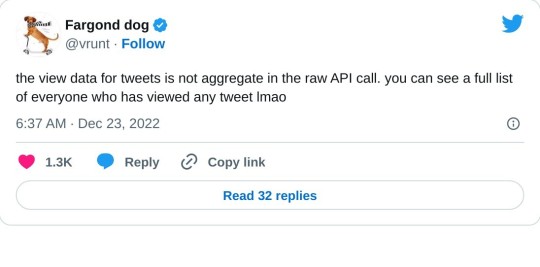
this is just proof that twitter's a security risk at this point. delete your account while you still can, i'm serious
3K notes
·
View notes
Text

YURI BLAST. RAAAAA
#maccadam#mtmte#cygate#instead of posting this just on a secret third shame twitter account I remembered tumblr honestly afford me the same amount of privacy. yay#but I hate tagging bc I’m scared of looking like the tags on a ao3 chatfic#transformers#cyclonus#tailgate#sorry class
1K notes
·
View notes
Text


fairy king
#scribbles#u kno waht should just start posting shameless bullshit here more now. entirely forget about twitter and privacy
916 notes
·
View notes
Text
I didn't know about KOSA until today so I'm trying to help spread the word too
KOSA stands for Kids Online Safety Act and by wording of the bill would give state attorney generals the power to sue and ban websites that have content that is "harmful and explicit" which is stated in the bill. Sites that would be attacked would be Twitter, A03, Tumblr, Tiktok, and many more and the people that made this bill and are pushing for it have clearly come out to say that they will be using this to ban trans and LGBTQ+ content. They are pushing it as protecting kids online and helping to prevent eating disorders but in reality, it is to censor people and continue the attack on trans and queer people and children. The sponsors of this bill are publically homophobic and transphobic and these same people and offices are also co-sponsoring the Restrict Act.
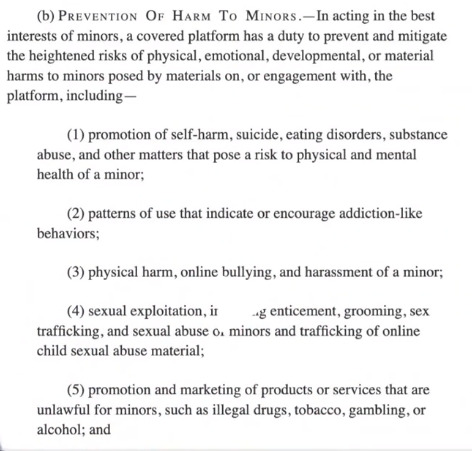
If any site has any type of content that contains queer themes, state attorney generals will have the power to take them down.
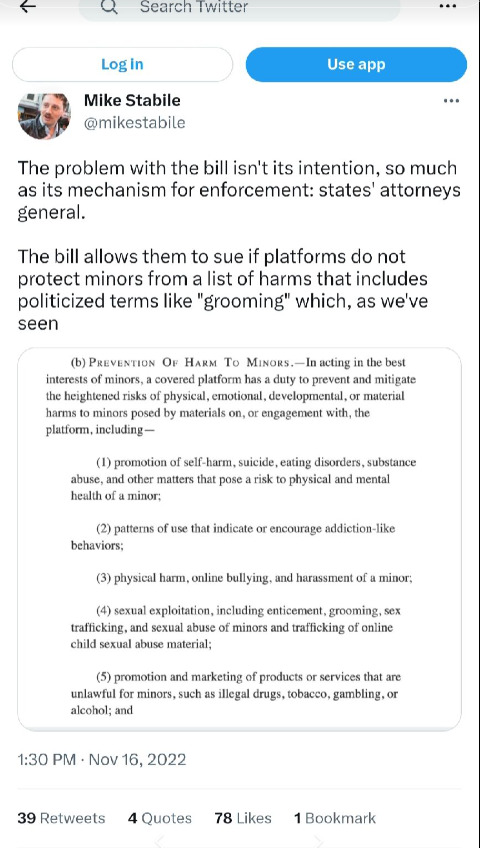
Over 100 LGBTQ+ and human organizations expressed concern over this bill that was originally brought up last year and they have repeatedly said that their concerns have not been addressed. They are being actively ignored by the offices that are writing this bill.
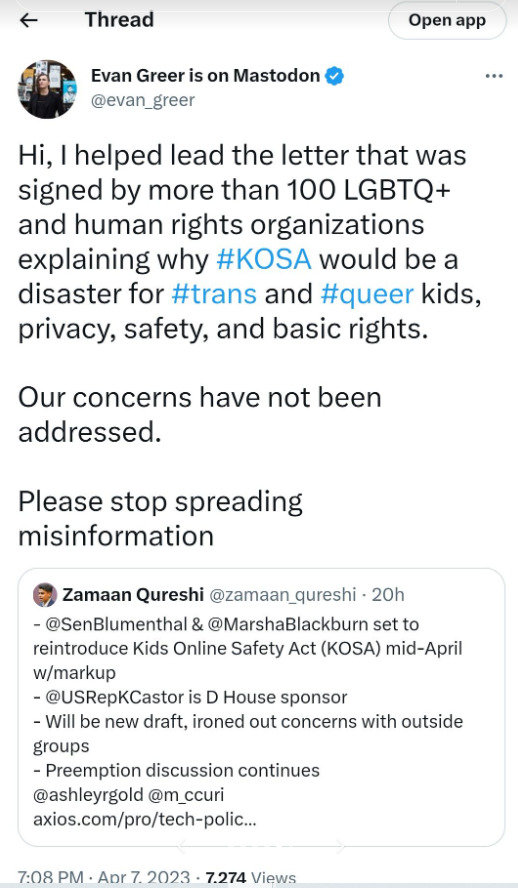
This person on Tiktok explains it all very well
And this is her link tree for petitions and to explain
This is a very important topic and is not getting enough attention. This bill threatens LGBTQ+ and trans children and Republican offices are ignoring organizations that say it's a bad bill. We are on a very slippery slope regarding LGBTQ+ issues
If you can, please reblog. We need to spread the word about this bill
#kosa#kosa act#kosa bill#internet censorship#earn it act#american politics#politics#internet privacy#queer#kids online safety act#twitter#tiktok#tumblr#a03#wattpad#mental health#lgbtq rights#lgbtq#lgbtq community#transgender#trans rights#fuck you america#i fucking hate you
427 notes
·
View notes
Text
Anyone who follows me on here with a Twitter/X account:
In case you haven't heard, the Twitter Privacy Policy is changing on September 29th. The new policy states that any public content uploaded there will be used to train AI models. This, in addition to the overarching content policy which gives Twitter the right to "use, copy, reproduce, process, adapt, modify, publish and display" any content published on the platform without permission or creator compensation, means that any original content on there could potentially be used to generate AI content for use on the platform, without the original creator's consent.
If you publish original content on Twitter (especially art) and you don't like or agree with the policy update, now may be the time to review the changes for yourself and if necessary take things down before the policy update is published.
Edit: I wanna offer a brief apology for the original post, my wording was a bit unclear and may have drawn people to the wrong assumptions! I have changed the original post a bit now to hopefully be a more accurate reflection of the situation.
Let me just clarify some things since I certainly don't wanna fearmonger and also I feel like some people may take this more seriously than it actually is!:
The part of the privacy policy I mentioned regarding "use, copy, reproduce, process, adapt, modify, publish and display" is included in the policies of every social media site nowadays. That part on its own is not scary, as they have to include that in order to show your content to other users and have it published outside of the site (ie. embedding on other sites, news articles).
The scenario I mentioned is pretty unlikely to happen, I highly doubt the site will suddenly start stealing art or other consent and use it to pump stuff out all over the web without consent or compensation. I simply mentioned it because the fact that the data is being used to train AI models means that stuff on there may end up being used as references for it at some point, and that could then lead to the scenario I mentioned where peoples content becomes the food for new AI content. I don't know myself how likely that is for definite, but I know many people still don't trust the training of AI, which is why I feel it is important to mention.
I cannot offer professional or foolproof advice to people on the platform who have posted content before, I'm just some guy! I don't wanna make people freak out or anything. If you have content already on the site, chances are its probably already floating around somewhere you wouldn't want it. That's, unfortunately, the reality of the internet. You don't have to take down everything you've ever posted or delete your accounts, however I wouldn't recommend posting new content on the site if you are uncomfortable with the changes.
THIS POST WAS MADE FOR AWARENESS ONLY!! I AM NOT SUGGESTING WHAT YOU SHOULD AND SHOULD NOT DO, I AM NOT RESPONSIBLE!! /lh
TL;DR: I worded the original post slightly poorly, for clarification the policy being changed to allow for AI training doesn't automatically mean that all your creations will be stolen and be recreated with AI or anything, it just means that those creations will be used to teach the AI to make things of it's own. If you don't like the sound of that, consider looking into this matter yourself for a more detailed insight.
308 notes
·
View notes
Text

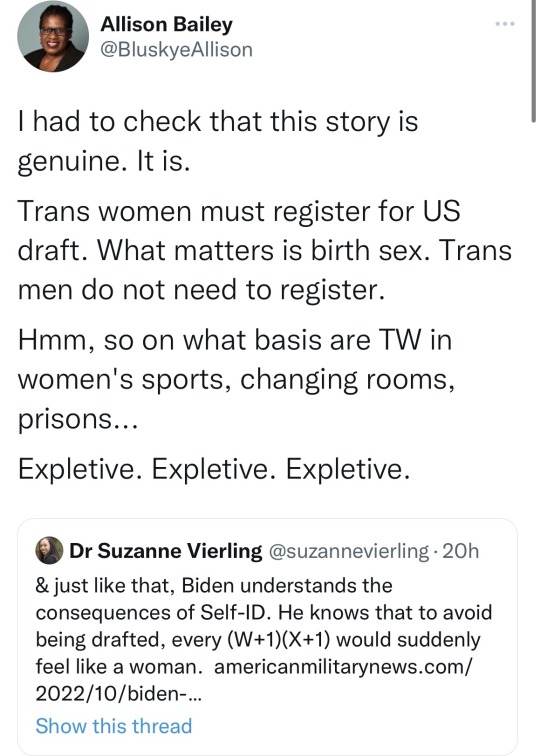

#radfems please touch#radfems interact#radfem#radical feminism#gender critical#twitter#on one hand yay men still have to sign up for draft <3#on the other hand what kind of fuck assery?#we all pretend to not know what women are when it comes to our spaces privacy and protection#UNTIL it effects men and their miwitary#HELL WORLD
2K notes
·
View notes
Text
Local European law PhD person is breaking down why Twitter is in trouble with European authorities - bc we live in a dystopia and I am procrastinating my research.
TL;DR : Twitter is loosing all the experts required to actually make (good, but really any) decisions regarding data privacy in Europe, and it's even funnier because they picked the one(1) European country that would give them the most tax cut but it's also the one that is really into dragging Big Tech all the way to the highest instances in the EU to make knock them down a peg.
But also more under the cut bc this is hilarious and I CANNOT WAIT for Elon Musk to discover the EU. Very much going to be a unstoppable force meets unmovable object situation, because trust me, TRUST ME, there are few things as slow, inhert and full of bureaucrats who are NOT on twitter as the EU. Anyway here is too many paragraph of me putting my diploma to good use or something, my Masters Director would be proud.
Step 1: TF is the GDPR, like, actually.
Ok the the General Directive on Privacy Regulation is a European Union Regulation, which sets clear rule on what you can and cannot do with people's information/data, in order to protect their privacy. It is very wide and very cool and the US wishes it had it (Except you, California, you're doing great).
And what's cool is also that the moment you want your digital services to be available on European territory, you need to comply with the GDPR. Doesn't matter where you are based, if it's not GDPR compliant, you don't get access to that sweet sweet European market.
For example, after the GDPR was entered into force, there were a bunch of US News Media website I could not access, because they were not complying with the GDPR yet, and were not willing to take the risk to infringe on the GDPR. Doesn't matter if they are not Europe based. What matters is the market. Dw they are fine now.
Ok, cool.
.
Step 2: Twitter was doing ok so far - I know, I'm surprised as well.
So Twitter is a US-based company, but blue-bird had to comply with the GDPR like everyone else. So far, so good-ish, and by that I mean that Twitter was not really targeted by any European or national authority for not complying.
But let me tell you the thing about the GDPR: it is. a. mess. Getting to UNDERSTAND what's even required guaranteed my cohort of European Law major that we would ALL be employed in the upcoming years. It is atrociously difficult. THE REGULATION HAS ITS OWN WEBSITE imagine a law having its own website, what the hell honestly.
The GDPR is challenging for your local true crime book club handling the email addresses of its 12 members, ok.
IMAGINE WHAT IT'S LIKE FOR TWITTER.
Behemoth social media platforms require a massive amount of workforce and expertise to make sure they comply with the GDPR. Like, I cannot stress the absurd amount of work and constant vigilance it requires. But they were doing ok.
.
Step 3: Elon Musk is an authoritarian manchild and Twitter is bleeding experts
I know both things are related but trust me, it's important to mention them separately, you'll see in a second.
Among the many high-ranking people who left, we have:
The Chief Information Security Officer
The Chief Privacy Officer / Data Protection Officier
The Chief Compliance Officer (unconfirmed officially but I would bet on it)
So they are trying to do some emergency creative problem solving by apparently having data engineers be the ones certifying compliance with the GDPR (lmao as someone who works with a bunch of data scientist I would pay money to see that happening) and nominate people to temporarily take over all these positions. To be transparent the guy they nominated as "acting GPO" (lmao I'm really feeling the confidence right now) does not seem fully incompetent, but this is still hilarious.
.
Step 4: Haha it's funny because it's Ireland
Now, ok, here is the kicker.
Twitter so far has been using a system that the GDPR allows, which is the One-Stop Shop. OSS means that Twitter picked the authorities of a specific EU State to report to, when it comes to compliance to the GDPR, it's easier for everyone than massive online companies like Twitter going to 27 different states to report what they are doing.
So they picked Ireland, because their European headquarters are based in Ireland.
HA.
I. WONDER. WHY. IRELAND???
(spoiler: it's because Ireland is a tax haven).
Now. You might think there is ONE problem on the table, but get ready, there are TWO, baby.
Haha Twitter's GDPR person has left, mate, you want to explain how you're going to comply with the GDPR when you don't have you GDPR experts anymore??
Elon Musk is, as stated before, an authoritarian manchild and the GDPR is also not super super fond of that, mate if you want the OSS system you actually need to give minimal guarantee that the data-privacy-decision-making is happening in the State of the OSS. When clearly, right now, decisions are happening wherever the hell Elon Musk decided to have his morning protein shake, and I'm pretty sure it's not Dublin. And also around 50% of the Dublin headquarters have been fired, so I don't know who is supposed to take decisions over there, honestly.
AND YOU KNOW WHAT'S EVEN FUNNIER.
IRISH COURTS IS REALLY. REALLY INTO EU LAW AND EU DATA PRIVACY
Like the case about the guy who sued Facebook for violating the right to privacy in the way it handled data? It's the Maximillian Schrems v Data Protection Commissioner case, and it comes from Ireland. Irish Judges had no issue being like "Yeah, Facebook or not, we're choosing violence".
.
Step 5: Ok now what ? Aka I sit back and grab some popcorn
So right now, Twitter is trying to convince the DPC that it's totally absolutely doing GREAT.
Sure Jan.
Anyway, the question is whether the DPC is willing to buy it. We know there has been meetings, and the DPC is at least putting SOME form of pressure on Twitter.
Outcome 1: the DPC is feeling petty and does NOT buy it. Then I'll write another post, but I think the DPC would give Twitter some time to put things in order and give enough guarantees before going on the offensive.
Outcome 2: the DPC buys it (because Dublin LOVES its Big Tech companies, and they are driving prices up to the point where Dublin is experiencing a massive housing crisis, it's fine, this is fine) . And we wait for an individual/NGO to bring a formal complain to the DPC, for the DPC to refuse it, and for the individual/NGO to challenge that decision before the Irish Courts and that becomes a whole new story that will warrant its own post - and I get to show off some useless knowledge on EU procedural law.
473 notes
·
View notes
Text

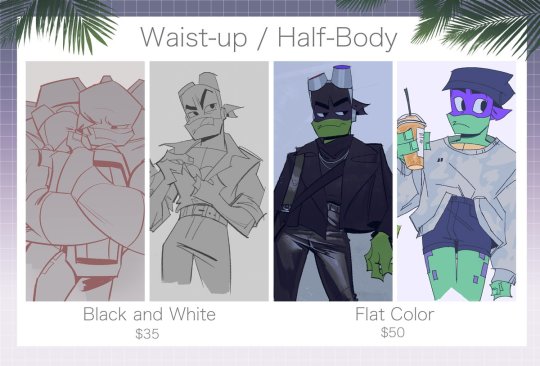
🐢 Opening ROTTMNT commissions! 🐢
💜 Taking 5 spots at a time
📩 Email me at [email] if interested
(DM-ing here on Twitter is also ok)
🍃 More information here, please read:
[google docs link]
(8 Sep 2020)
79 notes
·
View notes
Text
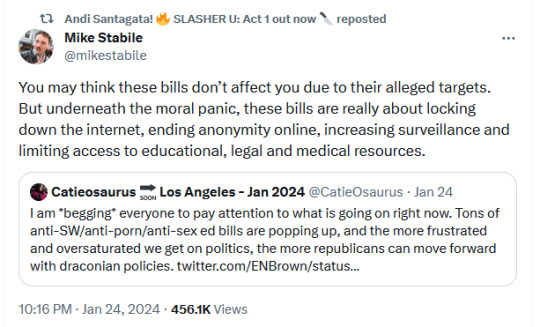
219 notes
·
View notes
